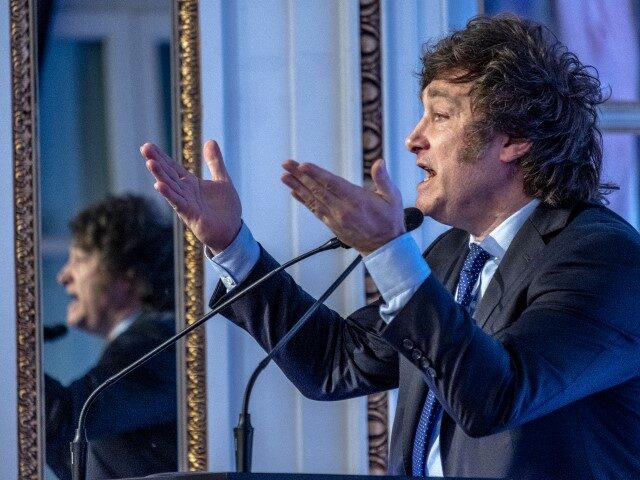The United Nations requested to be allowed to participate in the ongoing Argentine Congress debates regarding the massive small-government omnibus bill presented by President Javier Milei in December, local media reported over the weekend.
The formal request, issued by the Regional Representative for South America of the Office of the United Nations High Commissioner for Human Rights (OHCHR) Jan Jarab, seeks permission from the heads of the three committees that are debating the bill to be allowed to realize online “virtual expositions” to Congress on the U.N.’s “perspective” on how the bill relates to international human rights obligations.
“We would like to present the perspective that emanates from our mandate – that is, from international human rights obligations and standards,” the U.N. letter read.
The U.N.’s request was forwarded to Congress by Argentine lawmaker Germán Martínez, who leads the parliamentary block of the Union for the Nation, a socialist coalition represented by former socialist Economy Minister Sergio Massa in last year’s presidential election and which represents the previous Argentine government led by socialist former President Alberto Fernández.
Martínez published a copy of the letter on social media on Saturday evening. The lawmaker demanded that the U.N. be allowed to debate among duly elected Argentine lawmakers, claiming it is “unacceptable to prevent the voice of the United Nations from being heard.”
La ONU, a través de la Oficina Regional para América del Sur del Alto Comisionado de Naciones Unidas para los Derechos Humanos, solicitó exponer sobre la "ley ómnibus" en las comisiones @DiputadosAR.
Exigimos formalmente que se conceda esa posibilidad cuando las comisiones… pic.twitter.com/Jz8LjfKRjx
— GERMAN MARTINEZ (@gerpmartinez) January 20, 2024
The 351-page, 664-article-long omnibus bill Milei presented, titled “Basic and Starting Points for the Freedom of Argentines,” seeks to implement significant sweeping reforms to the Argentine state in matters of the economy, taxes, politics, security, education, and the nation’s electoral system.
The omnibus bill’s contents represent roughly two-thirds of Milei’s planned reforms for Argentina. Shortly before its presentation, Milei signed a Necessity and Urgency Decree (DNU), a form of executive order, that modified or outright rescinded over 350 socialist policies implemented by previous leftist administrations. The omnibus bill also aims to formalize most of the DNU’s content by codifying it into law.
The omnibus bill is presently being discussed in three commissions. One commission discusses the contents of the bill that pertain to general legislation, the second is centered around budget-related topics, and the last one is dedicated to constitutional affairs.
Martín Menem — the head of Argentina’s Chamber of Deputies, the lower house of Congress — announced on Sunday that it is likely that the committees will reach a consensus by Tuesday, which will allow the bill to proceed into the Chamber of Deputies for subsequent discussions in the plenary, with the participation of the full Chamber.
“We are working to reach agreements in order to have a majority opinion on Tuesday, that is the objective,” Menem told local media. “Obviously, there are 257 deputies, each block has its own ideological affiliation, each one has its own recipes and its own way of seeing reality.”
“We have our own approach. We are not going to negotiate anything that may jeopardize the freedom of the Argentines, we are not going to work for that to happen,” he continued.
If a consensus is reached on Tuesday, the bill is expected to be introduced to the full chamber on Thursday. The General Confederation of Labour, an Argentine leftist trade union, is planning to hold a one-day strike on Wednesday to protest Milei and the omnibus bill.
Christian K. Caruzo is a Venezuelan writer and documents life under socialism. You can follow him on Twitter here.

COMMENTS
Please let us know if you're having issues with commenting.